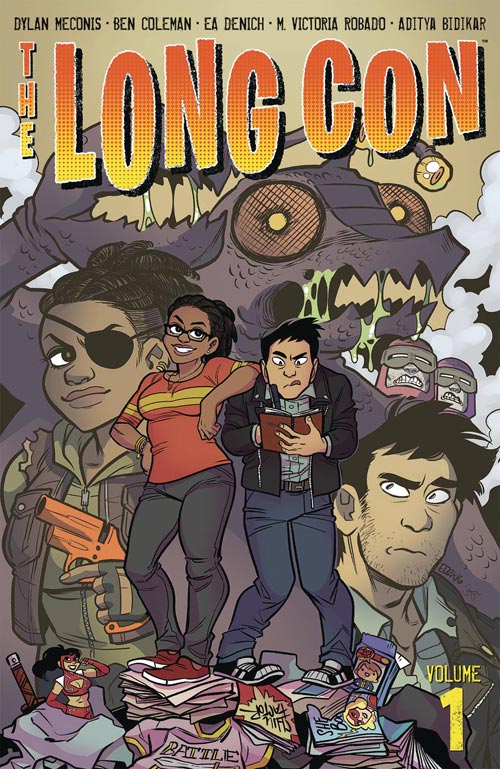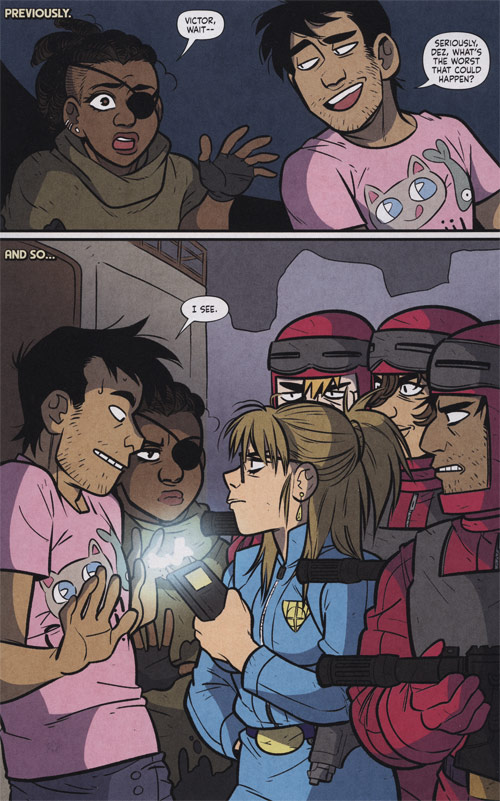A Long Con Of Costumes, Critiques, & Chaos
Oct 12, 2018
 |
by Vince Brusio
Some would say that walking between worlds is a neat trick if you can master it. Others would call it profitable. Imagine the money you’d get paid from the government to do it on their time? The truth is that if you pick up The Long Con Volume 1 TP (OCT181821) from Dylan Meconis & Ben Coleman, you’ll see that walking between worlds is really as simple as going to your local comic convention. Fantasy is juxtaposed with reality, and somewhere in the middle they came up with the idea for a series that’s been put out by Oni Press. The Long Con shows what’s to love about a nerdfest, and how it might get you killed, too. Read our exclusive interview here with both writers, and see if you can count the number of Easter Eggs squeezed into a panel.
**********
Vince Brusio: Ok, the question on everyone’s mind is how much of The Long Con is fiction, and how much of it is first-person shooter? Meaning, what personal convention experiences did you squeeze into the panels?
Ben Coleman: Dylan is the real convention veteran of the team, but I think each of us have drawn on some of the more surreal moments we've experienced. For me, the biggest thing is the thin walls between fantasy and reality at conventions. Is that a cop, or someone cosplaying one? Is that your favorite writer, or just someone manning her booth?
I'm especially fond of something I see at a lot of Cons where a group of cosplayers are "off duty" over by the loading docks or whatever. They have their helmets and/or angel wings off, their posture is totally different, and they're just leaning against a wall smoking cigarettes and shooting the breeze. It's somewhere exactly halfway between fantasy and reality, and I love it.
Dylan Meconis: The most notable thing that made it into the comic is actually something that my wife experienced! At San Diego Comic-Con International, the back wall of the exhibit hall is lined with heavy fire doors that only guests, exhibitors and staff/security are allowed through. On the other side is an industrial freight access corridor that spans the whole length of the convention center. If you’re a celebrity guest, traversing an exhibit hall packed with fans is going to take hours. So if you need to get from your photo op booth to your panel appearance, they take you back into the access corridor, pop you on a little electric golf cart, and whisk you to the other side of the show in mere minutes. Katie was not a celebrity guest, but she had an exhibitor badge, a sore foot, and a very winning demeanor, and a passing cart driver gave her a lift on his way to presumably pick up Nathan Fillion. The access tunnels, the covert celebrity transit system, and the golf cart all play a pivotal role in The Long Con.
Vince Brusio: Give us the scoop on your cast of characters. Reporter Victor Lai, his friend Dez Delaney, who are they underneath? What makes them ideal nerd fans that should make us pump our fists and cheer?
Ben Coleman: Dez and Victor are the kind of folks we'd like to run into at a convention. Dez has a boundless well of enthusiasm and a diplomatic mindset, and has zero use for jerks and blowhards. Victor is an amiable slacker who's used to winging it, but he's also got a keen eye for a good story and an ability to get people to open up to him (often to his regret).
I think we're all pretty sick of seeing nerdy characters in media limited to awkward dorks with chunky glasses and no social skills. We really wanted to show the kinds of nerds *we* see at Cons, who have a lot to recommend to them beyond an endless well of trivia and referential t-shirts.
Dylan Meconis: Victor Lai is the hapless convention outsider – an underemployed reporter working the local events beat, which is not exactly the Pulitzer-winning work he envisioned in journalism school. A decade of chipping away at his student loans by covering the local bridal expo has made Victor a skeptical dude. He still has a spark of professional curiosity, though, and the convention world is undeniably wild. So when everything goes terribly, terribly wrong, and an already bizarre setting becomes ground zero for humanity’s last stand, his self-preservation instincts are pitted against his original drive to uncover the truth. Victor’s a stand-in for every normal human who’s ever walked into a show for work or for random kicks or to mollify a nerdy loved one and been simultaneously fascinated and repulsed.
Dez Delaney is a stand-in for a ton of my colleagues in the comics industry. Comics are, kind of like theater, a huge amount of work, and a lot of the people you see working on a convention floor aren’t writers or artists or even retailers – they’re editors, publicists, marketing staff, designers, coordinators. They could all probably be making more money in another industry, but they’re in comics because they love the artform. They do possibly dozens of conventions a year and they’re total road warriors. Dez’s steely cynicism about the industry she works in is offset by the fact that she is an unashamed nerd who still genuinely loves this stuff, and is able to laugh off some of the more surreal elements.
Vince Brusio: Jeff Parker has compared The Long Con to Galaxy Quest. What would you say is the basis for such a comparison?
Ben Coleman: I'm pretty sure we name-dropped Galaxy Quest at least a few times in our initial pitch, and I’m extremely gratified that Jeff picked up on that. For me the biggest lesson from that movie is that if you're going to do an affectionate parody of fan culture, you need to show the reason they're fans in the first place. Yeah the actors are jerks and the fanboys are obsessive, but at the heart of it is this TV show that's fun and silly and very genuine. So one big thing we wanted to make sure of is that all the goofy fictional franchises we came up with had something in them that our goofy fictional fans connected with.
Dylan Meconis: Galaxy Quest is a loving subculture satire. It’s very frank about the drawbacks and shortcomings of pop culture fandom, but its ultimate message is that it’s actually very mature to love and invest in “silly” things. You just have to treat the people around you with that same level of care and respect. And, like Galaxy Quest, The Long Con uses a sudden and totally ridiculous escalation in stakes to really draw that point out. What if Star Trek were accidentally real? is a close cousin to what if the world ended but the convention kept going?
Vince Brusio: A sneak peek of interior pages are shown for the book in the October PREVIEWS catalog (Long Con #3 pages 13-16). How do these pages give us an overview of the book’s plot, scope, or tone?
Ben Coleman: Issue #3 is one of my favorite issues of the run, in that it introduces a couple of really fun characters and ties a bunch of visual and narrative threads together. Plus Em really outdid herself with all those fun background details. Here we meet Loren, Dez's intern and general purpose sidekick. Loren is a bunch of fun to write for: she's a very "in the moment" character who's very into her own enlightened self-interest and pushing people's buttons. But she's also got a proverbial heart of gold, and as a service to her fashion-forward millennial rep we make sure she has a new outfit and hairstyle pretty much every issue.
Those snotty creators are pretty much us by the way. We figured if we were going to be taking (mostly affectionate) shots at other people's creative egos we could hardly exempt ourselves from the firing line. Someday the world will be ready for “The Lone Corn.”
Dylan Meconis: Yeah, we set up a ton of things (which we will later gleefully destroy) in these pages! Loren Ipsum is basically what would happen if Bugs Bunny and April Ludgate from Parks and Recreation were blended together in a transporter accident and then given an Instagram account. And, in the midst of a lot of towering set pieces on the pre-disaster show floor, we wanted to show the comparatively modest reality of an independent publishing booth. There are such bizarre fluctuations in scale at a show like this – from mega-billion dollar movie franchises to comic books that are “a breakout success” because they’ve sold 20 copies today. But every scene has its rockstars, burnouts, up-and-comers and bitter also-rans, and the staffers who must tolerate them.
Vince Brusio: What kind of Easter Eggs might we look for in this series, given the breadth of pop culture one can find at any comic con?
Ben Coleman: As a fan of Easter Eggs myself, I know half the fun is spotting them in the first place. But there are plenty in there, and a good number are pretty oblique. Our rule of thumb we have is that you shouldn't need to know the deep lore of a specific franchise to get the jokes in our comic, but if you *do* then there's probably going to be something extra for you. So for example the Spock analog in our TOS analog has red skin, which is how Spock was initially conceived (it turns out that didn’t play well on black and white TVs). You don’t need to know that for the scene to make sense (one pointy-eared hobgoblin probably looks the same as any other, to most people) but that is a little shout-out to everyone else who spent their time in the Memory Alpha trenches.
Dylan Meconis: We put a lot of them in the backgrounds (a lot of the fake media properties are goofs on actual properties) and in the backmatter of individual issues. I’ve drawn some faux fanart closely modeled after actual drawings from old-school fandom publications, which has exposed me to a whole new level of knowledge about various popular slash pairings (Chakotay/Paris? Who knew!). Of all three of us, I’m probably the one who is least inclined to planting references that aren’t just explicit send-up. A lot of my other work is historical fiction, where I get to go absolutely bonkers with fussy references and then spill my guts in the footnotes. (“PAGE 452 – You may have noticed that the painting seen obliquely in panel 3 has the same composition as Gentileschi’s “Judith Beheading Holofernes,” whose provenance has blah blah blah.)
 |
**********
Vince Brusio writes about comics, and writes comics. He is the long-serving Editor of PREVIEWSworld.com, the creator of PUSSYCATS, and encourages everyone to keep the faith...and keep reading comics.




